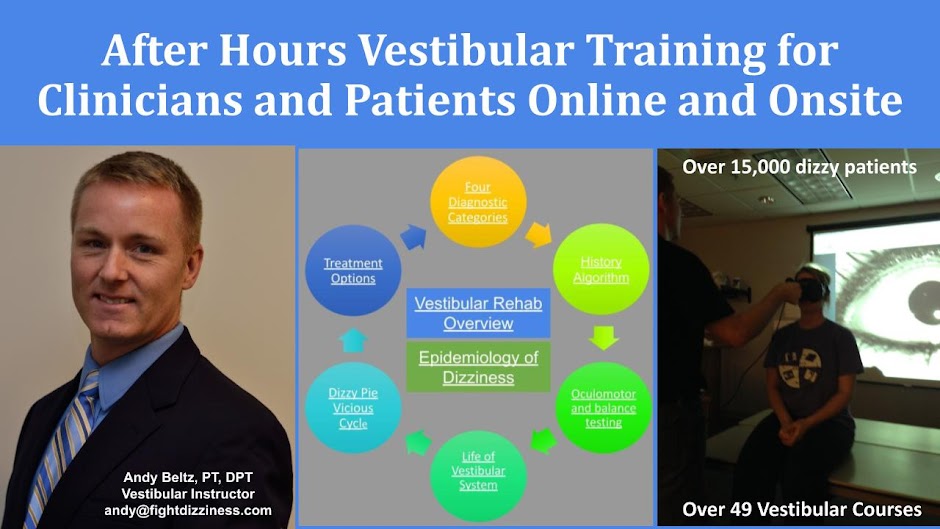Wednesday, August 31, 2011
Post Concussion Syndrome, Migraines and BPPV
This is another terrible triad. One of these problems alone can be plenty for one person to bear. However, I have seen individuals who are battling all three. All three of these problems can cause dizziness. For those battling these issues, the key to sucess is to be able to determine when each problem is causing certain symptoms. In addition, optimal neck health should be pursued when able to assist in managing the variety of sensations that can occur. When appropriate, vestibular rehab specialists can help individuals work through these problems.
Why "Dizzy!?"
This blog is now called "Dizzy!?" in honor of all those battling dizziness in one way or another. The exclamation point represents the intense fear and tension a person feels when they first experience dizziness. The question mark represents all the confusion that occurs finding help and trying to figure out why the dizziness is present in the first place.
Monday, August 29, 2011
Blog name change from "Constant Corrections" to "Dizzy!?"
It's time for a blog name change. Here is the blog name description to retire the first name of this blog: This blog is called, "Constant Corrections" because in order to have good balance and feel, well, not dizzy, our bodies must be able to make constant corrections regarding where it is in its environment. Even when we hold still our vestibular system is constantly adjusting the way our body senses where we are.
Thursday, August 25, 2011
Migraines, GERD and BPPV
Together, these three are a nasty treo. All three can cause nausea. Sometimes they can cause nausea at similar times and sometimes they can cause nausea at different times. Individuals battling all three need to have a strong understanding of how the different conditions may cause similar symptoms. Both GERD and BPPV can potentially cause nausea when lying down. BPPV can cause nausea indirectly... usually followed by spinning. When an individual has Migraines, they are more prone to BPPV and are likely to be nauseated (with or without vertigo). Both Migraine and BPPV can cause individuals to vomit which can aggravate GERD.
When treating BPPV in an individual with a history of GERD, caution has to be taken not to aggravate the GERD.
When treating BPPV in an individual with a history of GERD, caution has to be taken not to aggravate the GERD.
Wednesday, August 24, 2011
Earthquakes and the Vestibular System
Earthquakes are great at causing motion sickness. They provide the brain with exactly what it cannot stand: unpredictable and uncontrollable movement. One day after the earthquake, I have continued to hear others say they felt "woozy," motion sick and "not quite right" afterward. When the brain is not in control and movements happen that cannot be planned or expected, there are often disagreements between the sensors in our legs, trunk, neck, eyes and vestibular system. The brain does not like it when our sensory system is out of sync. When our movement sensors do not agree,we are prone toward motion sickness. Click here to learn more.
Tuesday, August 23, 2011
Earthquakes and Dizziness
Well, I felt the earthquake in Canton, Ohio today. I was sitting in my chair with my feet on a stool doing paperwork and my legs started to jiggle. I have never felt an earthquake before, but I knew something was not right. I called my wife and she stated she felt "woozy" around the time of the quake and didn't know why (she did not know we had an earthquake). Several people on facebook remarked how it caused them to feel dizzy and off balance. Of course, it's normal to feel off balance and other funny feelings when the earth shakes! This sensation should go away very quickly once the earth stops moving.
Learn more about earthquakes and dizziness
Learn more about earthquakes and dizziness
Tuesday, August 9, 2011
What are your limits of stability?
One fascinating aspect of balance therapy is helping others learn what their true limits are. Physically, one may be hindered by weakness, stiffness, lack of sensation, poor ability to adjust to different terrain or poor ability to see where they are going. These physical limitations may keep someone from having good balance.
On the other hand, individuals could actually have great physical abilities with balance, but they lack confidence in their ability to remain upright. In this case, their mental limits of stability causes them to not enjoy the wonderful balance they may have. Sometimes, these individuals can perceive normal sway as abnormal. This can lead to individuals becoming "scared stiff." It is impossible to have good balance when we are scared stiff!
Self efficacy drives our potential. Balance therapy is an excellent environment to identify the importance of knowing our true limits and reaching our potential.
On the other hand, individuals could actually have great physical abilities with balance, but they lack confidence in their ability to remain upright. In this case, their mental limits of stability causes them to not enjoy the wonderful balance they may have. Sometimes, these individuals can perceive normal sway as abnormal. This can lead to individuals becoming "scared stiff." It is impossible to have good balance when we are scared stiff!
Self efficacy drives our potential. Balance therapy is an excellent environment to identify the importance of knowing our true limits and reaching our potential.
Subscribe to:
Posts (Atom)
